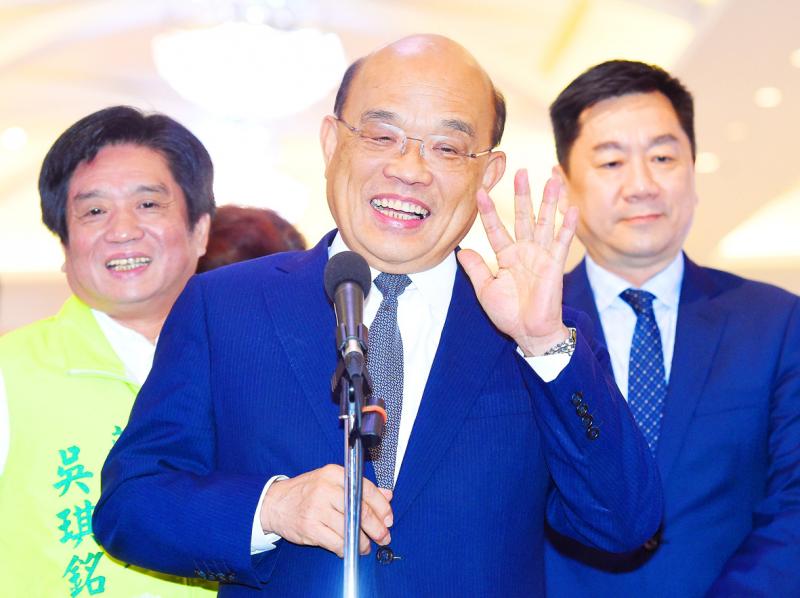The government would mount an iron-clad defense of the nation’s sovereignty and its people’s safety, Premier Su Tseng-chang (蘇貞昌) said yesterday after a Chinese warplane breached the nation’s air defense identification zone on Thursday night.
The warplane entered the nation’s southwestern air space twice, at 7:35pm and 7:36pm, and the Republic of China Air Force dispatched an aircraft to shadow and evict it after broadcasting a warning, the Ministry of National Defense said on Thursday.
The incident marked a rare occurrence of a Chinese warplane entering the zone after nightfall.

Photo: Liao Chen-huei, Taipei Times
The ministry on March 17 said that two Chinese aircraft on March 16 conducted a night-time drill near Taiwan’s southwestern airspace.
China is experiencing a resurgence of COVID-19 and heavy floods, but Beijing is not concentrating its energy on taking care of its people, Su said on the sidelines of an event in Taipei.
Instead it is sending warplanes to disrupt regional peace and put pressure on neighboring nations, which have condemned its actions, he said.
Taiwan, as a sovereign nation, would resolutely defend its airspace and protect its people, he said.
He urged Beijing to concentrate on caring for its people, rather than disturbing regional peace.
A military observer in southern Taiwan surnamed Hsu (許) said that Chinese aircraft have intruded into the nation’s airspace at least 20 times this year.
Thursday’s action was likely triggered by the six recent incidents involving E-8C battle command aircraft from the US flying over the Taiwan Strait, as well as large-scale military drills that the US and its allies have been conducting in the South China Sea, Hsu said.

The Central Election Commission has amended election and recall regulations to require elected office candidates to provide proof that they have no Chinese citizenship, a Cabinet report said. The commission on Oct. 29 last year revised the Measures for the Permission of Family-based Residence, Long-term Residence and Settlement of People from the Mainland Area in the Taiwan Area (大陸地區人民在台灣地區依親居留長期居留或定居許可辦法), the Executive Yuan said in a report it submitted to the legislature for review. The revision requires Chinese citizens applying for permanent residency to submit notarial documents showing that they have lost their Chinese household record and have renounced — or have never

A magnitude 5.6 earthquake struck off the coast of Yilan County at 12:37pm today, with clear shaking felt across much of northern Taiwan. There were no immediate reports of damage. The epicenter of the quake was 16.9km east-southeast of Yilan County Hall offshore at a depth of 66.8km, Central Weather Administration (CWA) data showed. The maximum intensity registered at a 4 in Yilan County’s Nanao Township (南澳) on Taiwan’s seven-tier scale. Other parts of Yilan, as well as certain areas of Hualien County, Taipei, New Taipei City, Taoyuan, Hsinchu County, Taichung and Miaoli County, recorded intensities of 3. Residents of Yilan County and Taipei received

Taiwan has secured another breakthrough in fruit exports, with jujubes, dragon fruit and lychees approved for shipment to the EU, the Ministry of Agriculture said yesterday. The Animal and Plant Health Inspection Agency on Thursday received formal notification of the approval from the EU, the ministry said, adding that the decision was expected to expand Taiwanese fruit producers’ access to high-end European markets. Taiwan exported 126 tonnes of lychees last year, valued at US$1.48 million, with Japan accounting for 102 tonnes. Other export destinations included New Zealand, Hong Kong, the US and Australia, ministry data showed. Jujube exports totaled 103 tonnes, valued at

BIG SPENDERS: Foreign investors bought the most Taiwan equities since 2005, signaling confidence that an AI boom would continue to benefit chipmakers Taiwan Semiconductor Manufacturing Co’s (TSMC, 台積電) market capitalization swelled to US$2 trillion for the first time following a 4.25 percent rally in its American depositary receipts (ADR) overnight, putting the world’s biggest contract chipmaker sixth on the list of the world’s biggest companies by market capitalization, just behind Amazon.com Inc. The site CompaniesMarketcap.com ranked TSMC ahead of Saudi Aramco and Meta Platforms Inc. The Taiwanese company’s ADRs on Tuesday surged to US$385.75 on the New York Stock Exchange, as strong demand for artificial intelligence (AI) applications led to chip supply constraints and boost revenue growth to record-breaking levels. Each TSMC ADR represents